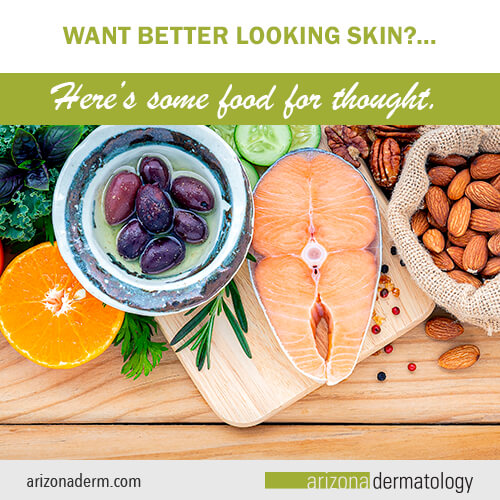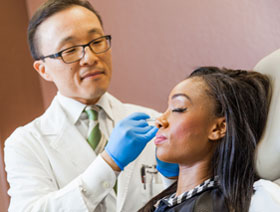 You are what you eat, and that goes for your skin, too. Believe it or not, your nutrition choices can have a measurable and noticeable effect on your skin. Let’s take a look at the best (and worst) foods for your skin, and why they have the impact they do.
You are what you eat, and that goes for your skin, too. Believe it or not, your nutrition choices can have a measurable and noticeable effect on your skin. Let’s take a look at the best (and worst) foods for your skin, and why they have the impact they do.
Your Skin Wants More of These:
Broccoli. A superfood for your skin, broccoli contains a number of skin-friendly ingredients including vitamin A (the main ingredient in Retin A), collagen-producing vitamin C (other foods rich in vitamin C include strawberries, red peppers and grapefruit), and vitamin K (which minimizes those dark circles under the eyes). In addition, broccoli contains a compound called sulforaphane, which maintains skin’s natural collagen levels as well as protects against sun damage. Lab testing has shown sulforaphane to reduce skin cell deaths by UV light by up to 29%! If you can only eat one vegetable, make it broccoli.
Red and Yellow Bell Peppers. In addition to being a building block of collagen, vitamin C has also been shown to noticeably reduce fine lines and wrinkles. A single cup of bell pepper provides over 300 percent of your daily recommendation of vitamin C. These colorful peppers also contain carotenoids, another antioxidant that decreases sun sensitivity.
Salmon. Wild-caught salmon is best, and salmon packs a one-two punch of healthy fatty acids (which are key for building the skin’s barrier to keep moisture in and toxins out) and vitamin D (one three-ounce serving of wild salmon just about meets your daily recommendation, meaning no need for risky sun exposure).
Tomatoes. Tomatoes have been shown to protect against UV damage due to their high concentration of lycopene. In fact, a study in the British Journal of Dermatology found that eating five tablespoons of tomato paste daily resulted in a 33 percent increase in protection from sunburn. Maybe it’s time for another lasagna night.
Nuts. Will nutritionists ever stop talking about nuts? Probably not. They are so good for so many reasons! When it comes to your skin, walnuts, with their high concentration of omega-3 fatty acids, are collagen factories. Almonds, rich in vitamin E, fight the aging effects of free radicals, and there’s even evidence that they might help prevent skin cancer. Here’s a tip– eat your almonds covered in dark chocolate (at least 70%). Dark chocolate has skin firming qualities, is low in sugar, and its flavonols serve as a powerful antioxidant.
Sunflower oil. Linoleic acid is an essential building block for ceramides, lipids that act as natural moisturizers in the skin. Sunflower oil may also reduce cellular inflammation, which is linked to aging. None on hand? Olive oil is another skin-friendly oil for cooking and consuming.
Greek yogurt. The probiotics and B vitamins in Greek yogurt help to detoxify the skin and reduce the appearance of fine lines and wrinkles. The trick is that the positive effects are unique to Greek yogurt and not regular, flavored yogurt, which is typically full of sugar and not good for you.
Japanese sweet potatoes. You might have to search for them, but these purple-skinned, light-fleshed tubers contain high concentrations of hyaluronic acid, one of the major ingredients in skin care products that improves skin elasticity and heals scar tissue. Hyaluronic acid is the main ingredient in dermal fillers.
Your Skin Doesn’t Want These:
Sugar. It’s no surprise that sugar is bad for you, but most people don’t know that sugar actually ages you through a process called glycation. Glycation occurs when sugar molecules attack cells, creating all kinds of health issues and damaging skin cell structure in a way that results in wrinkles, sagginess, and loss of radiance. Glycation also lowers your skin’s guard against toxins and sun damage, making you vulnerable to aging from both within and without. For more bad news, simple carbohydrates like white flour convert to sugar in the body, essentially causing the same problems. Bottom line: limit your sugar intake, especially added sugars and simple carbs.
Alcohol. Alcohol dehydrates the body, and that includes your skin. While a little drink here and there probably won’t age you any faster, regular alcohol consumption can show up on your face as dry skin, loss of volume, and more fine lines and wrinkles.
Fried foods. The unhealthy fats in fried foods release free radicals into your body, which attack cells and cause disease and premature aging. In addition, they clog pores, creating blemishes and aggravating acne-prone skin. Say no to fast and fried foods.
With so many great, healthy foods available, it’s easy to create a diet that supports your overall health, including your skin health. Healthy skin is younger-looking skin. Why not try a new recipe with anti-aging ingredients today?


